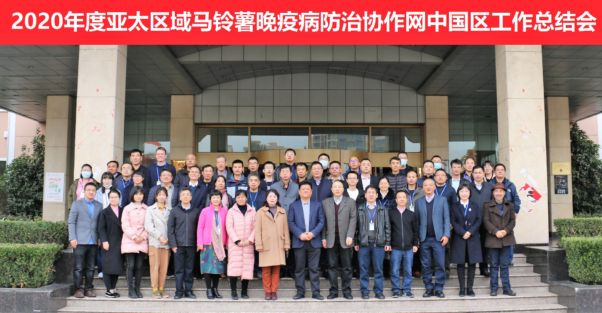As in many potato-growing parts of the world, late blight disease stifles production and earnings. In China, the story is no different as smallholder potato farmers lose millions of tons of potato and hundreds of millions of dollars annually in potential income due to this pathogen‘s effects.
To improve farming practices and technologies to overcome this challenge, the AsiaBlight – CIP-China Center for Asia Pacific (CCCAP) organized the 4th annual AsiaBlight meeting in Shandong last month. This gathering is a cooperative network of farmers, researchers and government officials who share information and ideas to optimize future potato yields. About sixty experts from more than ten provinces attended on the first day, which focused on research.
Lu Xiaoping, the Director of CCCAP, welcomed the attendees and provided a short history of the AsiaBlight network and reviewed the group‘s many accomplishments in 2020, who overcame many of the restrictions imposed by COVID-19.
Professor Shan Weixing, the Dean of the College of Agriculture at Northwest A&F University, delivered a report entitled, “Prevention and Control of Potato Late Blight.“ He told the audience that in the short-term many effective fungicides were available in the Chinese market and when used in combination with good early warning detection, they could be significantly effective in controlling late blight, However, he concluded, farmers will be better served by developing new varieties that display a natural resistance to the disease.
On the second day of the conference, 157 local potato farmers were invited to training conducted by the Tengzhou Agriculture and Rural Affairs Bureau to address challenges encountered in the cultivation process. The meeting provided time for farmers to speak with experts and businesses to help address their needs for combating late blight.
In a later session, the farmers were introduced to a late blight forecast system to prevent and control potato late blight. Che Xingbi, the General Coordinator of the AsiaBlight Network, and Zhao Zhijian of the Economic Crop Research Institute at the Yunnan Academy of Agricultural Sciences conducted the training.
In the final session of the day, Chairman Li Yisen, of the Yakeshi Senfeng Potato Company, discussed his business’s history and its responsibilities to help farmers. Chen Yawei, an expert breeder from the Henan Shangqiu Jinland Potato Research Institute, discussed new potato varieties’ progress to provide more extensive and more reliable yields for farmers.
The conference’s final day included several field visits, starting with the National Service Organization of Potato Late Blight Prevention and Control, the Tengzhou Hanhe Agricultural Plant Protection Company, and the Potato Planting Demonstration Base at Tengzhou FengGuYun Agricultural Science and Technology Park. At the final stop, the participants were introduced to Tengzhou’s use of UV rays to control potato late blight and innovative patterns of potato planting to reduce the disease’s spread.
Notable attendees included:
- Li Ping, Researcher, National Agricultural Technology Development Service Center
- Li Guangyao, Director of Tengzhou Municipal Agricultural Office, Agricultural and Rural Comprehensive Service Center and Municipal Agricultural and Rural Bureau;
- Kong Lingqiang, Tengzhou Agricultural and Rural Bureau and Director of Rural Energy Service Center
- Yang Jianguo, Head of Tengzhou Plant Protection and Inspection Station







